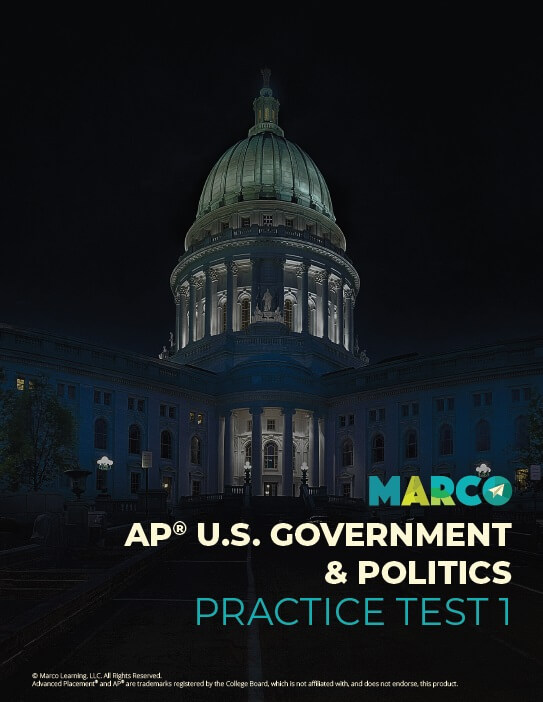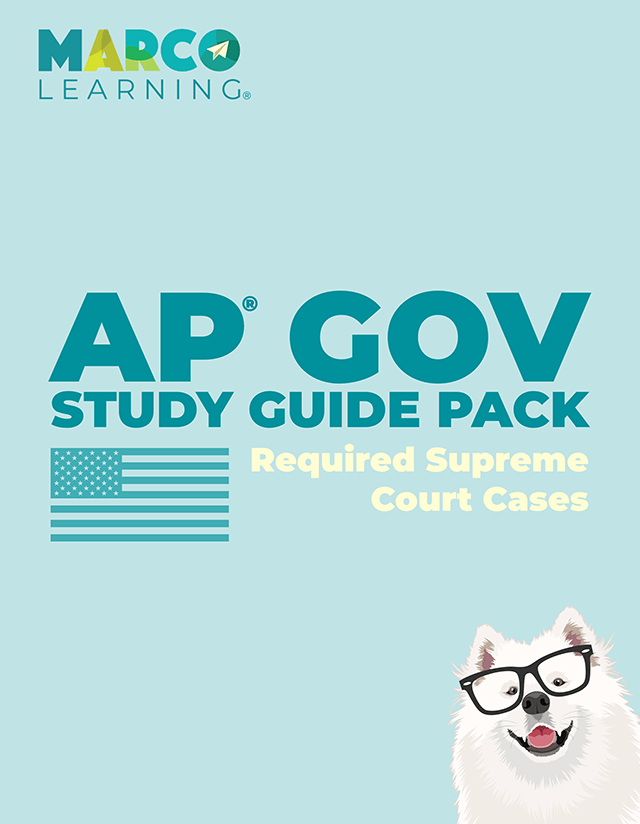


To score well on your AP® U.S. Government and Politics Exam, it is important to become familiar with all of the required Supreme Court cases. In the free-response section of your AP U.S. Government Exam, you will have to answer four essay questions. The third of these questions is a SCOTUS comparison essay, in which you will be required to compare a non-required Supreme Court case with a required Supreme Court case, so get to know each required Supreme Court case as well as possible!
The required Supreme Court cases for the AP U.S. Government and Politics Exam in 2021 are:
Marbury v. Madison (1803)
McCulloch v. Maryland (1819)
Schenck v. the United States (1919)
Brown v. Board of Education (1954)
Engel v. Vitale (1962)
Baker v. Carr (1962)
Gideon v. Wainwright (1963)
Tinker v. Des Moines Independent Community School District (1969)
New York Times Co. v. United States (1971)
Wisconsin v. Yoder (1972)
Roe v. Wade (1973)
Shaw v. Reno (1993)
United States v. Lopez (1995)
McDonald v. Chicago (2010)
Citizens United v. Federal Election Commission (2010)
Baker v. Carr (1962)
Baker v. Carr is one of the required Supreme Court cases for AP U.S. Government and Politics. This case resulted in the decision that facilitated the development of the “one person, one vote” doctrine and enabled federal courts to weigh in on legislative redistricting questions.
Tom Richey delves deeper into the facts of the case in this video:
FACTS OF THE CASE
The Tennessee State Constitution mandated that legislative districts be redrawn every ten years to ensure that those districts be substantially proportional according to population. In 1962, Charles Baker and other Tennessee citizens sued Joe Carr, Secretary of State for Tennessee, alleging that the state had failed to redraw its legislative districts since 1901. At issue was the fact that the population of Shelby County, in which Baker had been mayor, had drastically shifted such that the urban areas contained about 10 times as many citizens as the rural areas and that the rural areas were therefore overrepresented in the old legislative districts.
In response to the suit, the state of Tennessee argued that the issue of legislative redistricting was a “non-justiciable” political question, as the Supreme Court had ruled in Colegrove v. Green (1946). As such, the state argued, redistricting was not properly within the jurisdiction of the Supreme Court.
THE DECISION
In a 6-2 opinion, the Court ruled that the Tennessee case did not contain any pertinent political questions and that legislative redistricting was indeed an appropriate matter on which the Supreme Court could intervene. Justice William Brennan provided past examples of the Court intervening to correct errors in state administration and stated that the Fourteenth Amendment’s equal protection guarantee warranted judicial intervention in Tennessee.
IMPACT
The decision in Baker v. Carr did not immediately lead to major shifts in electoral maps, but laid an important precedent for the ability of the judiciary to weigh in on issues of legislative apportionment. Moreover, it strengthened the centrality of the principle of “one person, one vote” in the American political landscape.
PRECEDENT
Colgrove v. Green (1946)— argued that the federal judiciary did not have the power to interfere with issues related to the appointment of state legislatures.
SUBSEQUENT CASES
Reynolds v. Sims (1964)— established that the legislative districts of state governments must be approximately equal in population.
Shaw v. Reno (1993)— established that redistricting based on race must be held to strict scrutiny under the Fourteenth Amendment.
KEY TERMS
Justiciable The types of matters for which it is appropriate and legal for a court to make pronouncements.
Legislative Apportionment The process by which legislative seats are distributed among the areas entitled to representation.
The best way to get better at something is by practicing.
That’s why it’s so important that you take practice tests to help you get better at the AP U.S. Government and Politics Exam. Only then can you expect to get a good score—and even improve your score.
 Help
Help